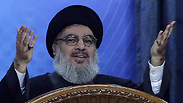
Hezbollah leader opposes US-led action in Syria
As US expands campaign against Islamic State to Syria from Iraq, Nasrallah stresses objection to military intervention, says country is 'mother of all terrorism and supporter of Zionist state.'
The leader of Hezbollah said on Tuesday he opposed US-led air strikes on Syria, where his Lebanese Shi'ite Muslim group has been fighting alongside forces loyal to President Bashar al-Assad.
Sayyed Hassan Nasrallah, whose group is one of the most important helping Assad fight a Sunni-dominated insurgency, was speaking after strikes against Islamic State (IS) and other groups in Lebanon's neighbour Syria.
"We are against American military intervention and an international coalition in Syria, whether that (action) is against the regime or IS," Nasrallah said in a speech aired on Hezbollah-run al-Manar television.
Related stories:
- Nasrallah: Islamic State is a monster coming to devour region
- Nasrallah: No red lines in Hezbollah's security war with Israel
- US, Iran seek common ground against militants, but doubts persist
"US military intervention, whether under the guise of an international coalition or under the cover of NATO or under the guise of multinational forces: we have a principled position based on basic rules and norms," he said.
"America, is in our view, the mother of terrorism and the origin of terrorism," he said, adding this meant the United States was not ethically qualified to lead a "war on terrorism".
Nasrallah also went on to say that "America provides complete support for the terrorism of the Zionist state. It supports Israel militarily, financially, legally, and even provides it veto in the United Nations Security Council," Al-Akhbar quoted him as saying.
The US and five Arab countries launched airstrikes Monday night on Islamic State group targets in Syria, expanding a military campaign into a country whose three-year civil war has given the brutal militant group a safe haven.
Using a mix of manned aircraft — fighter jets and bombers — plus Tomahawk cruise missiles, the strikes were part of the expanded military campaign that President Barack Obama authorized nearly two weeks ago in order to disrupt and destroy the Islamic State militants, who have slaughtered thousands of people, beheaded Westerners — including two American journalists — and captured large swaths of Syria and northern and western Iraq.
Nasrallah, whose group is backed by Shi'ite Muslim power Iran, has previously described Islamic State as a growing "monster" that could threaten Jordan, Saudi Arabia, Kuwait and other Gulf states.
Hezbollah has sent thousands of fighters into Syria's civil war. Its role in Syria has helped Assad beat back the rebellion against his rule in critical areas of the country including Damascus and a corridor of territory stretching north from the capital. But large parts of Syria's less densely-populated north and east have fallen to Islamic State.
The Syrian war spilled into the Lebanese border town of Arsal on Aug. 2, triggering five days of battles between the Lebanese army and militants including members of Islamic State.
Nasrallah appealed to the Lebanese government to negotiate with militants holding a group of Lebanese soldiers captured during the fighting, saying that it was possible to bargain with the captors from a position of strength.
Islamic State and al Qaeda-linked Nusra Front have said they have executed some of the captive Lebanese soldiers and it is not clear how many are still being held.
Hezbollah has said it stayed out of the Arsal battle, wary of inflaming sectarian tensions with Lebanese Sunnis, many of whom have supported the uprising against Assad.
Roi Kais contributed to this report.










